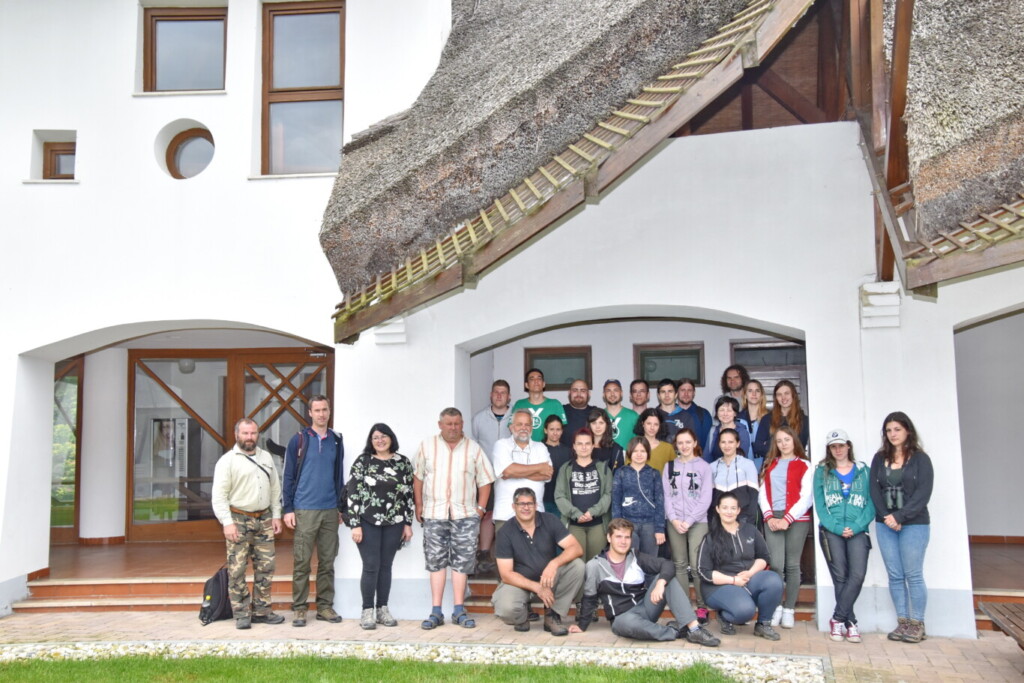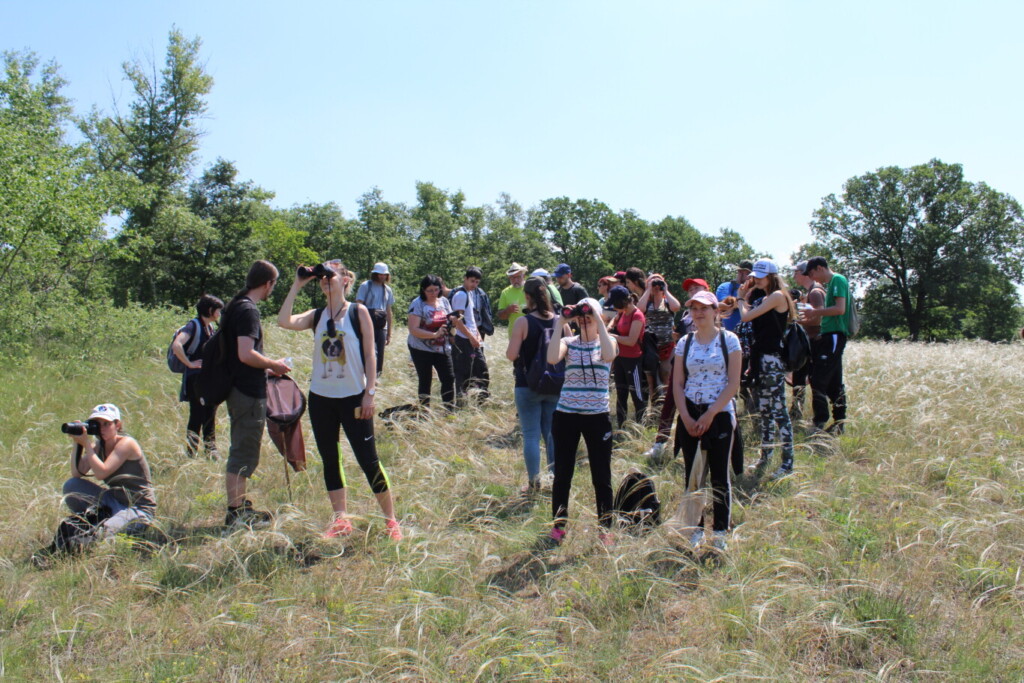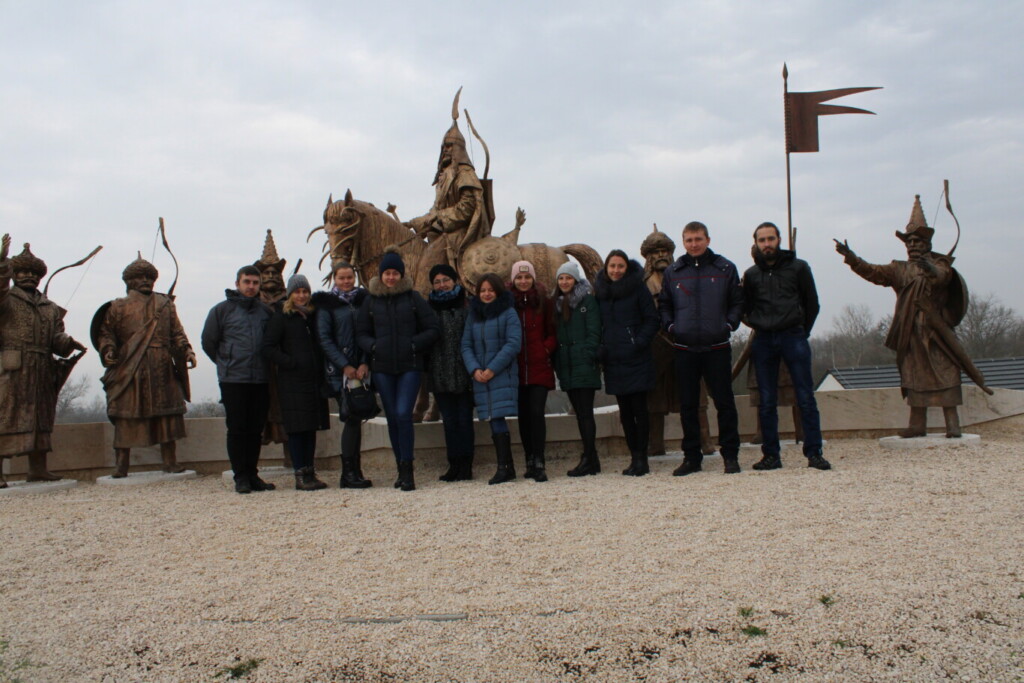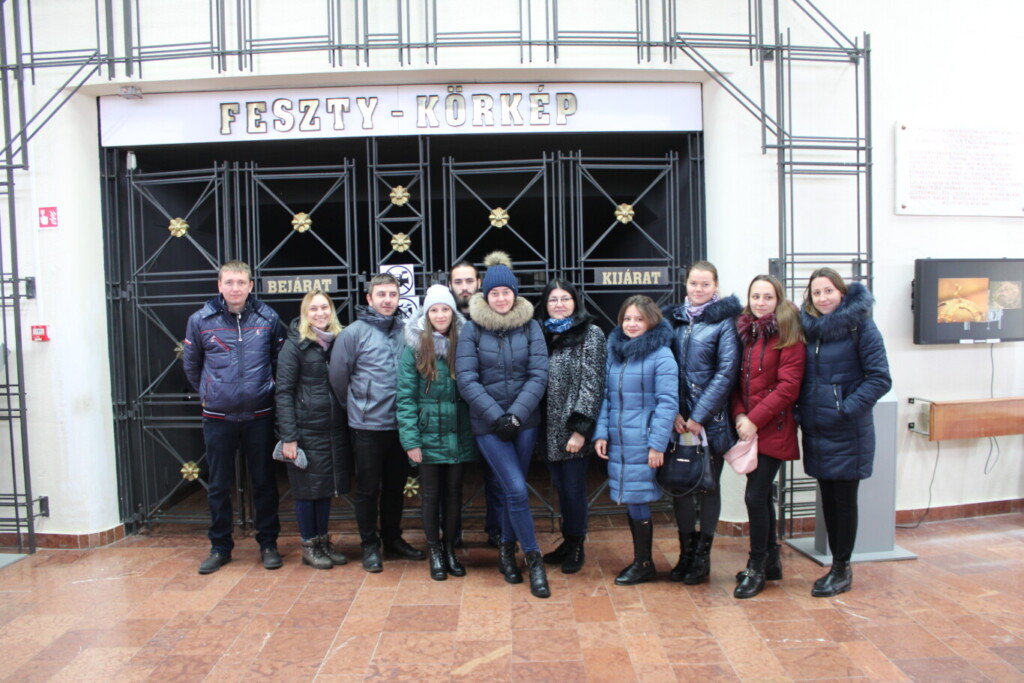Field Trips
The program for compulsory field trips is designed to ensure that students become familiar with the natural treasures of Transcarpathia and its surrounding region. To further deepen their professional knowledge, we regularly organize study trips and thematic practices to botanical gardens, zoos, museums, thematic collections, research institutes, and protected natural areas.
Through these field trips, students gain in-depth knowledge of the composition of the region’s characteristic habitats and wildlife, as well as practical experience in nature conservation. Participants have the opportunity to visit locations such as:
- Velyka Dobron’ Wildlife Reserve
- Uzhhorod Botanical Garden
- Uzhhorod Zoological Museum
- Several divisions of the Carpathian Biosphere Reserve (e.g., the Valley of Narcissi, the Kuziy Reserve, and the Yulivska Hora and Chorna Hora Reserves)
- Museum of Ecology of the Carpathians
- Selected sections of Synevyr National Park (e.g., the Glukhan and Zamshatka oligotrophic raised bogs)
- Uzhanskyi National Park
- Róna-havas mountain range
- Highly protected habitats of the Hungarian lilac (Syringa josikaea) in Zhdeniievo and Klymets
- Nyíregyháza Zoo in Hungary
In addition to compulsory field trips, optional thematic practices are regularly organized to provide students with further hands-on experience.
In addition to compulsory field trips, optional thematic practices are regularly organized to provide students with further hands-on experience.
BSc
Between October 14 and 16, 2016, we organized an optional thematic field trip to the Botanical Garden of the College of Nyíregyháza and the Nyíregyháza Zoo. The program also included visits to the adventure park in Sátoraljaújhely, the Museum of the Hungarian Language in Széphalom, and the Tisza Lake Ecocentre in Poroszló.
On September 16, 2017, first- to third-year biology students from the Department of Biology and Chemistry participated in a one-day comprehensive field trip covering botanical, ecological, and zoological aspects within the territory of Uzhanskyi National Park and the Carpathian Biosphere Reserve. As part of this extensive professional program, students were able to study in detail the characteristics of foothill and mid-mountain plant communities in their autumn aspect, the unique flora and fauna of Transcarpathia’s now-rare primeval beech forests, the riverine landscapes of the Uzh River’s source region, and the millennium-old pedunculate oaks of Stuzhytsia. They also received first-hand information on the Ukrainian and international ranking systems for protected areas. (https://kme.org.ua/hu/hirek/biologusok-terepgyakorlata-az-ungi-nemzeti-parkban/)
Between September 20 and 24, 2017, the 78th National Agriculture and Food Industry Exhibition and Fair (OMÉK) was held in Budapest, attended by instructors and students from the Department of Biology and Chemistry, specializing in biology and horticultural engineering. During the event, our staff and students explored the latest methods in modern crop production and animal husbandry, became acquainted with technological innovations in agricultural machinery, and studied the characteristics of both native and newly bred animal species.
During a three-day practice held from February 16–18, 2018, our instructors and students visited the visitor center of the Szatmár-Bereg Nature Park in Kisar, the Hungarian Agricultural Museum in Budapest, the Budapest Zoo and Botanical Garden, the ELTE Botanical Garden (Füvészkert) in Budapest, the citadel of Visegrád, and the Budakeszi Wildlife Park.
From May 11 to 15, 2018, instructors and students from the Department of Biology and Chemistry of the Ferenc Rakoczi II Transcarpathian Hungarian University, the Department of Environmental Science at the Cluj-Napoca Faculty of Sapientia Hungarian University of Transylvania, the Department of Biology at the Faculty of Education of Selye János University, and the Savaria Department of Biology of ELTE TTK participated in a practical training course titled “Teaching the Living Natural Environment of the Carpathian Basin.” The event was organized by the ELTE TTK Savaria Department of Biology at the invitation of the Fertő-Hanság National Park Directorate. During the four-day field trip, participants became acquainted with the operation of the István Csapody Nature School in Fertőújlak, visited the feather-grass sand steppes of the Little Hungarian Plain near Gönyű, took part in a canoe trip in the Szigetköz, observed bird ringing at Lake Fertő, conducted botanical and zoological collections on the saline steppes and hillsides near Lake Fertő, and gained insight into the conservation work carried out in the various sections of the Fertő-Hanság National Park.
From June 25 to 29, 2018, we organized a thematic field trip to Transylvania, Romania. During this trip, our students and instructors became acquainted with the natural and cultural heritage of Érmellék, Maramureș, the Apuseni Mountains, and the Transylvanian Basin, as well as with the Cluj-Napoca Faculty of the Sapientia Hungarian University of Transylvania. Programs were organized in the cities of Satu Mare, Baia Mare, Coltău, Cluj-Napoca, Turda, Rimetea, Aiud, Alba Iulia, Hunedoara, Oradea, and Carei. During the trip, we visited the Alexandru Borza Botanical Garden maintained by Babeș-Bolyai University in Cluj-Napoca, the Turda Gorge, and the Turda Salt Mine. Additional visits included Aiud, Alba Iulia, and Hunedoara. In Carei, participants had the opportunity to view the zoologically significant African hunting trophy exhibition housed in the Károlyi family’s castle.
Between October 26 and 28, 2018, the Department of Biology and Chemistry organized an environmental education study trip for university instructors and students to the Lake Balaton area. During the trip, participants visited the bird park and palm house of the Festetics Palace in Keszthely, as well as the palace complex’s hunting exhibition. They also explored the Tapolca Lake Cave in the Balaton Uplands National Park, the Lavender House Visitor Centre in Tihany, and the Tihany Benedictine Abbey.
On May 4, 2019, the Department of Biology and Chemistry organized a comprehensive botanical, zoological, and ecological field trip for first- and second-year biology students and their instructors. The trip included visits to the Valley of Narcissi, part of the Carpathian Biosphere Reserve, the Museum of Mountain Ecology and History of Nature Management in the Ukrainian Carpathians in the Rakhiv district, and the Kuziy Protected Massif.
From May 10 to 12, 2019, students and instructors from Ferenc Rakoczi II Transcarpathian Hungarian University, Sapientia Hungarian University of Transylvania, Selye János University, and the ELTE Savaria Department of Biology participated in a three-day training in Szigetköz, Hungary, at the invitation of the Trout Circle Association. Through nature walks, canoe trips, and bike tours, participants explored the rich aquatic life and natural values of Szigetköz. They also learned practical methods of environmental education, visited a fish ladder, and observed a cormorant nesting colony.
During a study trip abroad from June 25 to 28, 2019, participants visited sites in Hungary, Slovakia, and Austria. In addition to memorial sites and locations of cultural heritage, they learned about the natural features of the regions. The trip included visits to Selye János University in Komárom, the Natural History Museum and Schönbrunn Palace in Vienna, as well as the city of Košice, the Zádielska Valley, and the village of Borša.
On September 20, 2019, the Department of Biology and Chemistry organized a one-day field trip for students of all years, both full-time and correspondence, to the botanical protected areas near the villages of Zhdeniievo and Klymets (Lviv Oblast).
Between December 6 and 8, 2019, an environmental education study trip was organized to explore the natural and cultural attractions of southern Hungary. Participants visited the interactive exhibitions of the Ópusztaszer National Heritage Park, the Botanical Garden of the University of Szeged, and the Canopy Walkway in Makó, located in the floodplain of the Maros River.
On May 22, 2021, the Department of Biology and Chemistry of Ferenc Rakoczi II Transcarpathian Hungarian University organized a field trip to the Carpathian Biosphere Reserve, the most significant protected area in Transcarpathia. First- and second-year biology students participated in the trip, deepening their knowledge in botany, zoology, ecology, and environmental protection.
Between June 22–25, 2021, the Department organized a complex botanical, zoological, and ecological field trip for first- and second-year biology students to the Velyka Dobron’ Wildlife Reserve.
From October 1–3, 2021, a three-day field trip was held for third-, fourth-, fifth-, and sixth-year biology students in the village of Lypovets’. The base for the trip was the Buczkó István Mountain Research Base and Field Practice Venue.
On June 24–25, 2022, fourth-year biology students participated in a botanical, zoological, and biogeographical field trip. They visited the Glukhan oligotrophic bog in Synevyr National Park, as well as the Chorna Hora Botanical Reserve (near Vynohradiv) and the Yulivska Hora Botanical Reserve (near Yulivtsi), both part of the Carpathian Biosphere Reserve.
On May 12, 2023, the Department organized a field trip for first- and second-year biology students and first-year natural sciences students to the Valley of Narcissi, the Museum of Mountain Ecology and History of Nature Management in the Ukrainian Carpathians in the Rakhiv district, and the Kuziy Protected Massif, all part of the Carpathian Biosphere Reserve.
From June 26–29, 2023, a complex botanical, zoological, and ecological field trip was organized for first- and second-year biology students and first-year natural sciences students in the area of the Velyka Dobron’ Wildlife Reserve.
On September 15–16, 2023, third- and fourth-year biology students (both full-time and correspondence) participated in a two-day botanical, zoological, and biogeographical field trip. On the first day, they visited Synevyr National Park, while on the second day, they explored the Chorna Hora and Yulivska Hora Botanical Reserves.
On October 6, 2023, an autumn field trip was organized for second-, third-, and fourth-year students to the highly protected habitats of the Hungarian lilac (Syringa josikaea) near the villages of Zdeniievo and Pidpolozzia.
Between June 27–29, 2024, a botanical, zoological, and biogeographical field trip was held for first- to third-year students at the Buczkó István Mountain Research Base of the University in the village of Lypovets’.
2022. június 24-25-én a IV. évfolyamos biológia szakos hallgatók botanikai, zoológiai és biogeográfiai terepgyakorlaton vettek részt a Szinevéri Nemzeti Park (Alsószinevér település), Hluhanya oligotróf dagadólápban, a Kárpáti Bioszféra Rezervátumhoz tartozó Fekete-hegy Botanikai Rezervátum (Nagyszőlős) és a Gyulai-hegy Botanikai Rezervátum (Szőlősgyula) területén. (https://kme.org.ua/hu/hirek/iv-evfolyamos-biologia-szakos-hallgatok-terepgyakorlata/)
2023. május 12-én a II. Rákóczi Ferenc Kárpátaljai Magyar Főiskola Biológia és Kémia Tanszéke komplex botanikai, zoológiai, ökológiai terepgyakorlatot szervezett az I–II. évfolyamos biológia, valamint I. évfolyamos természettudományok szakos főiskolai hallgatók részére, a Kárpáti Bioszféra Rezervátumhoz tartozó Nárciszok völgyébe, a Rahói járásban található Kárpátok Ökológiája és Környezetgazdálkodásának Történeti Múzeumába, valamint a Kuziji Védett Területre. (https://kme.org.ua/hu/hirek/terepgyakorlat-a-karpati-bioszfera-rezervatum-teruleten/)
2023. június 26-29. között a II. Rákóczi Ferenc Kárpátaljai Magyar Főiskola Biológia és Kémia Tanszéke komplex botanikai, zoológiai, ökológiai terepgyakorlatot szervezett az I–II. évfolyamos biológia, valamint I. évfolyamos természettudományok szakos főiskolai hallgatók részére a Nagydobronyi Vadvédelmi Rezervátum területén. (https://kme.org.ua/hu/hirek/terepgyakorlat-a-nagydobronyi-vadvedelmi-rezervatum-teruleten/)
2023. szeptember 15-16-án a II. Rákóczi Ferenc Kárpátaljai Magyar Főiskola Biológia és Kémia Tanszéke kétnapos botanikai, zoológiai és biogeográfiai terepgyakorlatot szervezett, melyen a III-IV. évfolyamos biológia szakos, nappali és levelező tagozatos hallgatói vettek részt. Ezen az egyes szaktantárgyak révén megszerzett tudásukat mélyíthették. Szeptember 15-én lehetőségük nyílt eljutni a Szinevéri Nemzeti Parkba, dr. Kohut Erzsébet tanszékvezető asszony és Zselicki István tanszéki adjunktus vezetésével. Szeptember 16-án dr. Hadnagy István docens kísérte el a hallgatókat a Kárpáti Bioszféra Rezervátumhoz tartozó Fekete-hegy Botanikai Rezervátum (Nagyszőlős) és a Gyulai-hegy Botanikai Rezervátum (Szőlősgyula) területére. Mindkét terület országos jelentőségű rezervátum volt, amelyet 1997-ben csatoltak a Kárpáti Bioszféra Rezervátumhoz. (https://kme.org.ua/hu/hirek/biologus-hallgatok-oszi-terepgyakorlata/)
2023. október 6-án került sor az őszi terepgyakorlatra, melynek keretében nappali és levelező tagozatos hallgatóink (2-3-4. évfolyam) ellátogattak a fokozottan védett magyar orgona (Syringa josikaea Jacq. fil. ex Rchb) szarvasházi (Жденієво) és vezérszállási (Підполоззя) élőhelyeire. (https://kme.org.ua/hu/hirek/a-josika-orgona-nyomaban/)
2024. június 27–29-én a II. Rákóczi Ferenc Kárpátaljai Magyar Főiskola Biológia és Kémia Tanszéke botanikai, zoológiai és biogeográfiai tematikájú terepgyakorlatot szervezett az I–III. évfolyamos, nappali és levelező tagozatos, biológia és az embere egészsége, valamint természettudományok szakos hallgatói részére. A terepgyakorlat helyszínéül a II. RF KMF Buczkó István Hegyvidéki Kutatóbázisa szolgált Hárs (Lipovec) községben. (https://kme.org.ua/hu/hirek/hallgatoink-terepgyakorlata-az-ungi-nemzeti-parkban-es-a-rona-havason/)
MSc
On May 8, 2023, Dr. Anita Szikura organized a field trip for first-year MSc students to the Ardo Botanical Reserve near Berehove, a locally protected area situated on the Hill of Ardo.
Between June 26 and July 7, 2023, a two-week scientific field practice was held for first-year MSc biology students at the József Szikura Botanical Garden, led by Zoltán Kopor, head of the Botanical Garden.
On March 18, 2024, Dr. Éva Andrik and Dr. Anita Szikura, together with first- and second-year MSc biology students, conducted a joint field session to assess biodiversity indicators and evaluate the conservation value of the quarry lakes near Beregszász.
On April 15, 2024, Dr. Éva Andrik and the first- and second-year MSc biology students once again carried out a biodiversity survey of the same area.






